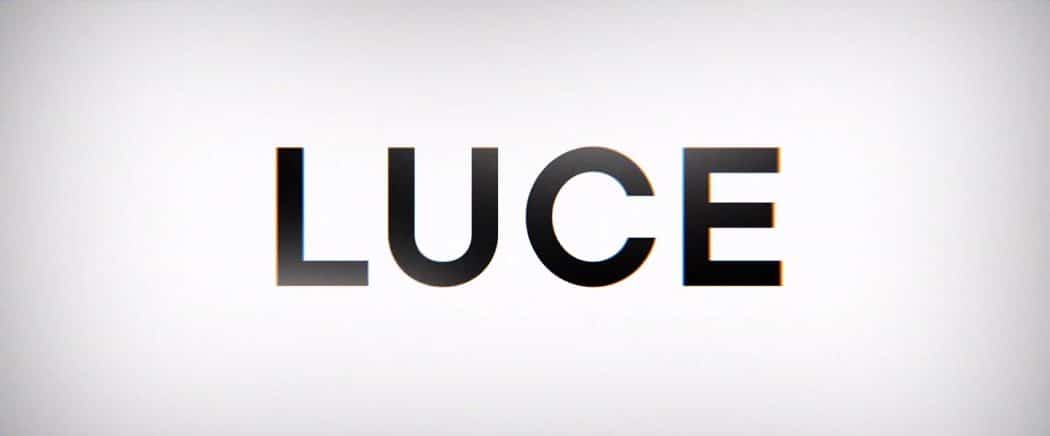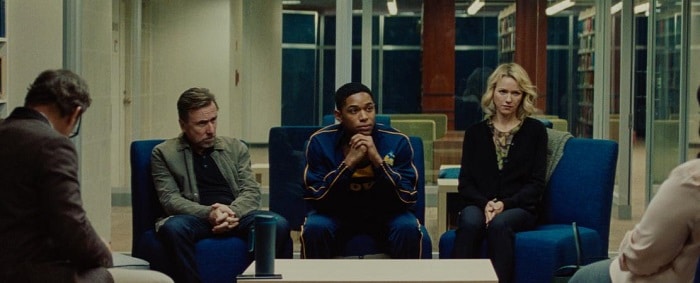
Luce Review
'Luce' will make the audience doubt everything it sees and hears.
Release Date: August 2, 2019
MPAA Rating: R
A married couple is forced to reckon with their idealized image of their son, adopted from war-torn Eritrea, after an alarming discovery by a devoted high school teacher threatens his status as an all-star student.
Director: Julius Onah
Screenwriters: Julius Onah, J.C. Lee
Producers: John Baker, Julius Onah, Andrew Yang
Cast: Kelvin Harrison Jr. (Luce Edgar), Naomi Watts (Amy Edgar), Tim Roth (Peter Edgar), Octavia Spencer (Harriet Wilson), Andrea Bang (Stephanie Kim), Marsha Stephanie Blake (Rosemary Wilson), Norbert Leo Butz (Dan Towson), Omar Brunson (Corey Johnson), Noah Gaynor (Kenny Orlicki), Astro (DeShaun Meeks), Christopher Mann (Coach Reeves)
Editor: Madeleine Gavin
Cinematographer: Larkin Seiple
Production Designer: Lisa Myers
Casting Director: Jessica Kelly
Music Score: Ben Salisbury, Geoff Barrow
Production

Some movies are simple. You’ve got a hero and a villain, there’s some sort of conflict, and everyone lives happily ever after. And then there are movies like Luce.
Luce is about a teenage boy named Luce Edgar (Kelvin Harrison Jr. from It Comes at Night) who was adopted from war-torn Eritrea as a child by parents Amy (The Impossible’s Naomi Watts) and Peter (The Hateful Eight’s Tim Roth). He’s always been a model child, getting exceptional grades, excelling at debate, and becoming a star athlete on the school track team. But when Luce’s history teacher, Harriet Wilson (Octavia Spencer from Ma), shares a disturbing assignment with his parents, red flags are raised. Amy and Peter start to think that maybe their perfect son isn’t quite so perfect.

Luce was directed by Julius Onah (The Cloverfield Paradox) from a script that he wrote with J.C. Lee (“How to Get Away with Murder”) and based on a play by Lee. It’s a compelling and confined mystery, surprisingly economic while still managing to paint a bigger picture. The story alternates shades of We Need to Talk About Kevin and Apt Pupil, but rather than take the dark turn that those movies do, Luce instead always keeps the viewer on their toes, constantly forcing them to question what they’re seeing and hearing. It’s manipulative, but in the best possible way.
The constantly shifting dynamic leads to serious trust issues, both for the characters and for the audience. As Amy and Peter dive into the details of their son’s life, they uncover secrets and lies which cause them to doubt their instincts. But Wilson seems to have an agenda of her own, and once Luce is confronted by his parents, the burden of proof shifts to his teacher. It’s hard to keep track of who’s supposed to be the protagonist and who’s supposed to be the antagonist in Luce, and that’s pretty much the point.

In one pivotal scene, Luce invites Wilson to observe a debate team practice where he subliminally confronts her about her actions with him and her philosophies towards her students. At first, Wilson just thinks she’s watching an intelligent kid make an airtight argument, but as things progress, she sees the event for what it is: a ruse to test her. She fights back, albeit as calmly as a high school teacher should in that situation, and it’s almost like a dance. None of the other students or teachers know the backstory, so it becomes a subtle chess match of words. Then, Luce politely thanks her for her help. And although Luce seems to have the upper hand, no winner is declared.
And that’s a running theme with Luce. At the risk of spoiling the unspoilable, the movie provides no solution to its mystery. The ambiguous ending hinges completely on who the audience believes. Who is more convincing, Luce or Wilson? Does Wilson have a crazy vendetta against Luce, or is Luce really the problem child that she makes him out to be? Luce doesn’t serve up any real answers, but it doesn’t matter. It’s still a very satisfying movie.

Score And Soundtrack

The music for Luce was composed by Ben Salisbury and Geoff Barrow, the same duo who scored the modern classics Ex Machina, Annihilation, and Free Fire. The score is percussive and edgy, heavy on the synthesizer without sounding like a retro-eighties soundtrack. Keeping with the suspenseful tone of the movie, the music is pulsing and pounding, anxious enough to keep the viewer’s heart rate up without ever calling attention to the fact that it’s doing it. It lets up occasionally, giving way to softer, gentler electronic ambience, but before the listener gets too comfortable, it’s back to its modern cop show theatrics again. The musical score for Luce is nothing short of brilliant.

